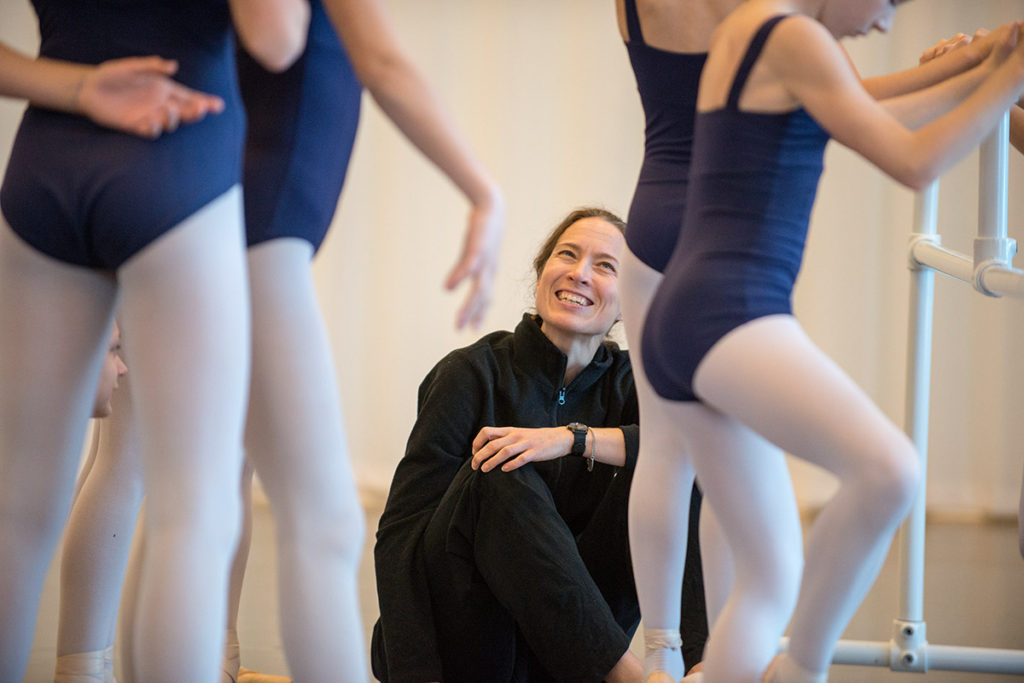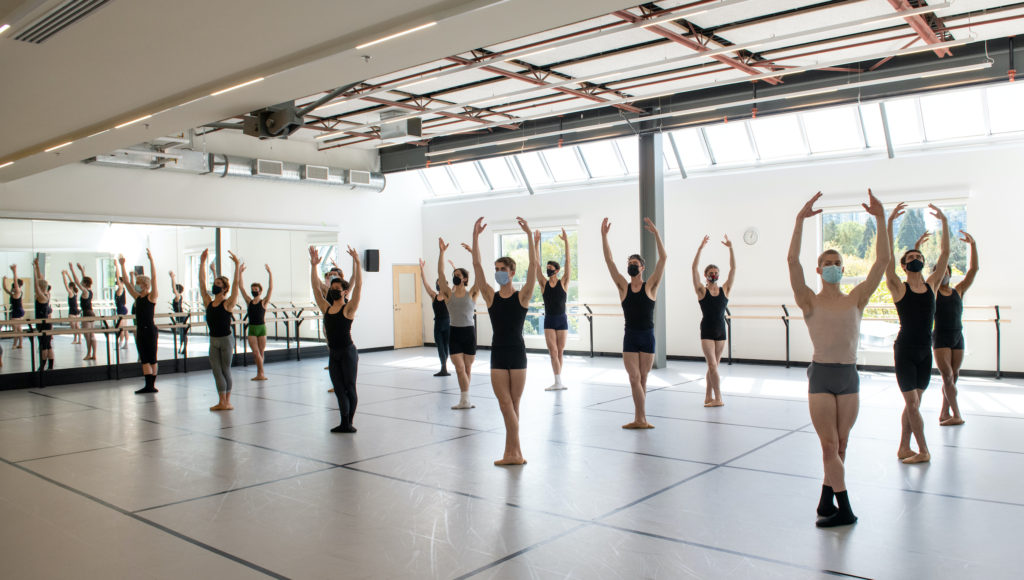
By Rebecca Karpus
The Arts Umbrella Senior Dance Company is in rehearsal. The dancers are masked, spaced, and do not touch one another. Despite these safety protocols, the studios on Vancouver’s Granville Island hum with excitement, hope, and tenacity. There is a captivating dualism of difficulty and opportunity in the air, which poses the question: How did the Arts Umbrella Dance Program remain so resilient and overcome the obstacles of the past 16 months of living and working during a global pandemic?
Faculty member Sabra Perry says that, in her experience, the beginning of the pandemic was hardest. Throughout the period of online classes, and even during the return to in-person but still physically distanced instruction, she found the lack of the usual collaboration between colleagues left a “big hole” in her day. Students felt this void, too, especially those whose families live abroad, wondering when travel would be safe again. During this lengthy uncertainty, Perry was able to provide students with one of the few stabilizing forces available: class. While ballet classes looked different than in pre-pandemic times, she hoped the routine alone would bring some sense of normalcy and comfort, and that those basic pliés and tendus might themselves feel like home.

Confronted with in-studio protocols, including physical distancing, Perry worked to integrate imagery and props in place of touch. She even contemplated how to touch without touching at all, asking the students to “use the space between you and another dancer to move that dancer and find connections.” It’s one of the creative ways that Perry found to keep the class engaged. “I haven’t been focused on what we can’t do,” she says, “but on what we can do.”
For Artemis Gordon, the artistic director of Arts Umbrella Dance, the lowest point for the program was nearly one year in, January 2021, when “the light at the end of the tunnel” was not yet in sight, and plans continued to be postponed and cancelled. Her approach was to embrace continued safety protocols, discussing with students in her classes and rehearsals how masks can serve as powerful and productive metaphors in life and art, and even questioning the “core” of performance. Gordon asked students what truly defines a performance, and, further, what elements can be removed before it would no longer be considered a performance?

To support the dancers’ emotional well-being, Gordon facilitated conversations on mental health, raising questions such as: What does it mean to not touch and not be touched? What does it mean to create relationships with each other when we can’t see faces? The impacts of COVID-19 pushed young dancers to grow up quickly, she believes, especially in tandem with current events. Recently, not only have there been more public conversations regarding systemic racism within the dance world, but also on abuse of power, sexual misconduct, and other damaging behaviours from authority figures. Gordon says that it is the “convergence” of these sobering conversations with the pandemic that has “really elevated students’ maturity and their sensitivity as artists.”
Despite restrictions, constantly shifting schedules, and COVID-19 fatigue, Gordon remains passionate about her ongoing exploration of what is truly required to develop a dance artist today. In her opinion, the solution is in “the essence, not the exterior.” While live performances and touring were not possible, the dancers were still able to capture the essence of both by engaging in film projects and online opportunities with international artists. The annual student choreography mentorship program with Crystal Pite could carry on in-person, since Vancouver is the renowned choreographer’s home base. Considering there were fewer regularly scheduled projects, there was also more time for rehearsals than in previous years.

Reflecting on all of the unravelled plans during the pandemic, Gordon says, “What we do is important, and we will continue to do it whether or not it’s with fewer people in the room, with less bells and whistles, and while wearing masks.” Gordon looks ahead to spring 2022, when the senior company intends to travel to Holland again, after the trip’s cancellation in spring 2020.
For Gordon, the 42-year-old non-profit arts education centre’s recent move into a bright new home felt especially significant during these challenging times. Previously occupied by Emily Carr University of Art + Design, the beautifully re-purposed Granville Island space features six spacious dance studios with sprung floors, outdoor terraces, a 132-seat theatre and lobby bar, a dancer lounge and kitchen, a costume room, and a physiotherapy room.
After almost a year and a half of unpredictability and instability in the world of arts and culture, the new space represents what matters most at the end of the day: “It tells everyone who walks into the building that the world thinks art is important,” says Gordon. And, she adds, it tells the students “that the world thinks your education is important.”
Rebecca Karpus is artistic administrator at Ballet BC and a freelance writer. She received her dance training from multiple schools, including Arts Umbrella’s professional training program.

